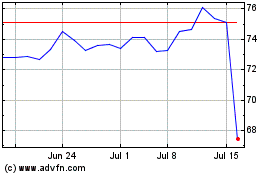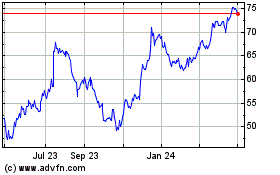GameStop Saga Prompts SEC to Weigh Review of Payment for Order Flow
March 09 2021 - 2:35PM
Dow Jones News
By Dave Michaels
WASHINGTON -- The Securities and Exchange Commission's acting
chairwoman signaled support for a wholesale review of a practice
that funnels many small investors' stock orders to be filled by
high-speed trading firms.
The system, known as payment for order flow, is decades old but
has generated greater scrutiny as more individual investors trade
on brokerage apps operated by companies such as Robinhood Markets
Inc. Online brokers like Robinhood make money by selling customers'
orders to firms such as Citadel Securities and Susquehanna
International Group LLP, which trade with them.
In a letter made public Tuesday, SEC Acting Chairwoman Allison
Herren Lee said regulators should examine such arrangements to make
sure practices are fully disclosed and "consistent with best
execution obligations." That requirement considers whether
customers get a better price than what is currently quoted in the
market, the speed of execution and the probability their order will
be filled.
Ms. Lee's letter, which was sent in response to questions from
Sen. Elizabeth Warren (D., Mass.), didn't say how or when the SEC
might start a review of payment for order flow. An agency
spokeswoman didn't immediately return a message seeking
comment.
Ms. Warren sent questions to the SEC in January after frenetic
trading in shares of GameStop Corp. and other so-called meme stocks
created such volatility that some brokers had to curb trading to
meet margin calls from their clearinghouses.
In the past, the SEC has repeatedly blessed payment for order
flow, saying brokerages monitor for conflicts of interest and that
it often results in better prices for small investors.
Nonetheless, the practice has long generated controversy, and
the rise of commission-free trading has put more focus on it. Firms
like Robinhood and Charles Schwab Corp. don't charge trading
commissions and instead make money from other sources such as
payment for order flow.
Some critics say the practice breeds bad incentives, since
brokerages may be tempted to send customer orders to the market
center that pays them the biggest rebate. Supporters, including
many brokers and trading firms, say the practice is misunderstood
and helps investors enjoy seamless trading and good prices.
A surge in trading among small investors has contributed to a
bigger slice of trading happening outside of regulated exchanges. A
record 47.2% of U.S. equity trading volume in January was executed
away from public stock exchanges, up from 39.9% a year earlier,
according to data from Rosenblatt Securities, a brokerage firm.
Ms. Lee's letter also said the SEC should consider new
regulations, such as greater disclosure of short selling and steps
to ensure small investors understand how options work. The Wall
Street Journal reported last month that the agency had started to
consider whether to draft new rules relating to short-sale
disclosures.
One provision of the 2010 Dodd-Frank financial overhaul law
required the SEC to issue rules within two years that would enhance
public information about the lending or borrowing of securities.
Another told the agency to publicly report, at least once a month,
on how much of a company's shares have been shorted.
Ms. Lee also wrote that regulators should consider requiring
brokerage firms to disclose more about how options trading works
and examine whether retail customers understand the products, which
allow traders to speculate more cheaply on stocks without buying
the shares. Robinhood Chief Executive Vlad Tenev said last month in
testimony to the House Financial Services Committee that Robinhood
has enhanced its educational materials about options trading and
boosted the eligibility criteria for new customers seeking to trade
certain kinds of options strategies.
The SEC is conducting a broad review of the trading in GameStop
shares, including whether any of the trading was manipulative and
whether brokerages followed all applicable rules.
"We are continuing to analyze the recent market events, and the
outcome of that review may ultimately lead us toward different or
additional policy considerations," Ms. Lee wrote in the letter.
Write to Dave Michaels at dave.michaels@wsj.com
(END) Dow Jones Newswires
March 09, 2021 14:20 ET (19:20 GMT)
Copyright (c) 2021 Dow Jones & Company, Inc.
Charles Schwab (NYSE:SCHW)
Historical Stock Chart
From Mar 2024 to Apr 2024

Charles Schwab (NYSE:SCHW)
Historical Stock Chart
From Apr 2023 to Apr 2024
